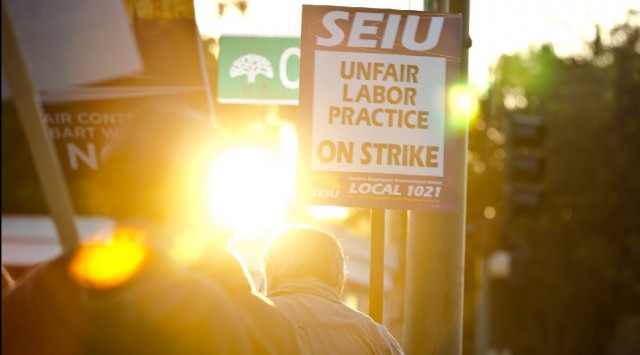BART's biggest unions walked out out twice earlier this year in the midst of bitter and still-not-completely resolved contract disputes. The two four-day walkouts, in July and October, appear to have had an impact on public opinion, with 52 percent of those surveyed in a recent Field Poll saying they oppose transit worker strikes. Widespread frustration with work stoppages at BART, which carries about 200,000 people a day, has triggered an online campaign to get the Legislature to ban such strikes in the future. And now the BART board of directors may get into the act, as it weighs a proposal for a ballot referendum asking Bay Area voters whether the system's workers ought to be allowed to strike.
Board member Joel Keller wants to put an advisory measure on the November 2014 ballot. He says the Legislature would still have to amend the law, reclassifying BART workers as essential and forcing binding arbitration for future labor negotiations.
"I want to hear from the riders; I want to hear from the unions," Keller said before the board met this morning. "I want to hear from the people in the Bay Area. I’ve come to the conclusion that these labor disruptions are very harmful to public transportation. I think we have to find a way to do better in the future for our riders and for the commuting public."
Keller said during the board's meeting that his experience in nearly two decades as a BART director led him to change his minds about strikes:
Nineteen years ago, if somebody had put that before this board, I would have said not "no," but "hell, no." But after 19 years, I’ve come to the conclusion that our riders deserve better than what has happened in the last six months. I see no alternative. This is my fifth labor negotiation at BART, and they have progressively been getting worse and worse and worse. And the people who get hurt are the riders and the commuters of the Bay Area.
Union officials blasted Keller's referendum proposal, calling it a politically motivated ploy to draw attention away from poor job performances by agency management and the board of directors. SEIU Executive Director Pete Castelli issued a statement saying:
In these past eight months, the Bay Area has witnessed how BART officials and their high-paid consultants like Thomas Hock have actively pursued a scorched earth policy to dismantle workers’ rights and workers' ability to improve workplace conditions. They’ve seen how the Board and Management have chosen to disregard workers’ concerns, resulting in a less reliable and more dangerous transportation system.
Riders and the Bay Area have seen how our elected Board has allowed the General Manager to run the system in a reckless manner, without consideration for the riding public or their own employees.
Instead of taking responsibility or demanding accountability, Director Keller prefers to point fingers and blame workers, just as those very workers are in the process of fixing Management’s alleged mistakes. This is not a way to run a train system.
BART concluded contracts with its biggest unions last month. But disputes continue over the agreements. One involves a potentially expensive family-leave provision included in the final contract language with SEIU Local 1021 and Amalgamated Transit Union Local 1555 that BART — despite its official signatures on the clause — insists it never agreed to. The second issue involves the effective date for new pension and retirement provisions for members of AFSCME Local 3993.
